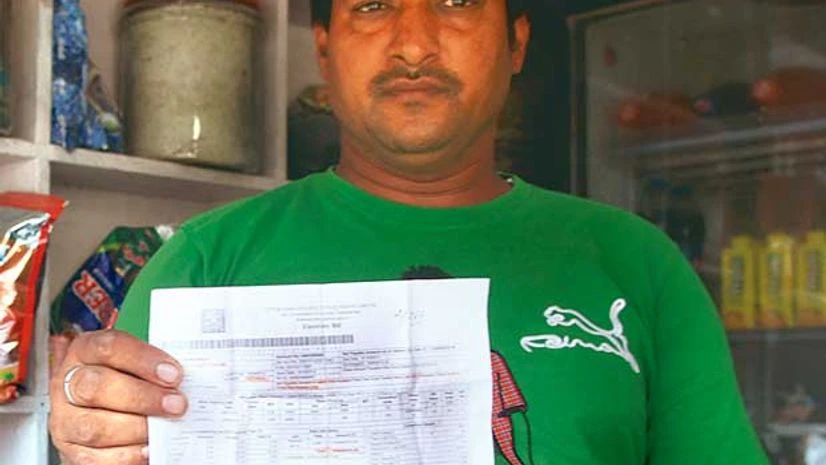As the town limits of Gohana begin, about 40 km from Sonipat in Haryana, Rajesh Chautala's name evokes mild interest and general dismissal. Other shopkeepers, while sharing directions how to reach this paanwaala's shop, feel that receiving a Rs 132-crore electricity bill doesn't deserve such attention. "Aap press se hain?" an appliance retailer asks me. "But why are you writing about him now? The bill has already been rectified," he muses while grudgingly pointing towards Puraani Anaaj Mandi where Chautala's shop is located.
A flamboyant yellow board spells his name in bold, red letters. On one side, it pays tribute to his spiritual guru, and on the other, to the local Goddess. The shop acts as a mini grocery store too, with a refrigerator for cold drinks. Chautala is missing from his shop when I reach. His aging father tells me that his son won't be here before 3 pm, in heavily-accented Hindi. When I explain that I work for a newspaper, he suggests I call Chautala on his mobile number mentioned on the board. He answers my call instantly, and instead of coming back at 3 pm, he arrives within minutes. He is surprised that the media is still interested in a case that for him and his kinsmen is "old news".
"You should write about the tunnel that the thieves in Sonipat dug up to loot a bank," he says, while agreeing to pose for the camera. When I begin to ask about the inflated electricity bill, he dishes it out of his slim-fit jeans pocket instantly. The sheet, tattered now from overuse, has the amount section highlighted with a neon marker."It was a holiday when they delivered the bill with a rectified amount of Rs 1,658," says Chautala. For one fan, one CFL light and one refrigerator, he feels that even that is too high. His three-room home usually runs a Rs 600 monthly bill. Before I can ask more questions, Chautala suggests that we move the landlord's office behind the building. "You can take his permission and then I can answer all questions," he says.
Also Read
His landlord, S N Gupta, is Chautala's 'cousin', and takes no rent from him. While Chautala, a Class X-pass, wears a fitted green t-shirt over his jeans, Gupta's dressing is more subdued and refined. Each question I ask needs a nod of approval from Gupta before his paanwaala cousin can answer. There is a brief consultation on Chautala's monthly income, before the figure of Rs 15,000 per month is disclosed to me. "The issue is not that the bill got rectified. It is the mental trauma and shock of receiving such a hefty amount," says Gupta. Nodding, Chautala says, "I could never dream of paying that amount even if I lived a hundred years." So was he harassed at the electricity department? "I never visited them. They read the reports in the papers and sent the bill on the next day of Diwali," he says, with a subtle glint in his eyes. The cousins, after receiving the bill, went straight to their journalist-friend at Punjab Kesari. Media attention seemed to be their priority. "We could have made an official complaint. But that would've meant sacking 118 employees and we didn't want that," Gupta answers before Chautala can get in a word.
About five kilometres from here, the Uttar Haryana Bijli Vitran Nigam's office is stacked with files. Satish Kumar, the commercial assistant, is not pleased with all this attention. "People should recognise that we made a mistake but rectified it despite it being a holiday for Vishwakarma Puja," he says. Kumar explains how a system upgrade led to an error in the multiplication factor, which has now been corrected. The discom is a loss-making entity with a projected loss of Rs 1951 crore for the current financial year. If Chautala had cleared the bill, it would have reduced the loss by 6 per cent - an expensive correction, it seems.

)
